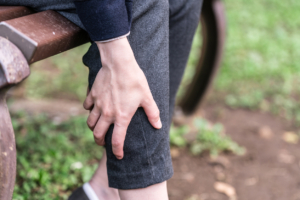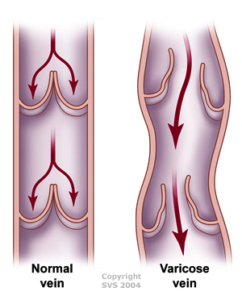Nearly 1 in 5 people will develop varicose veins in their lifetime, but the extent to which varicose veins will affect quality of life will differ. Thus many patients wounder: Why do varicose veins hurt? While some patients have little to no pain, and may not even realize they are developing varicose veins, others will experience painful varicose veins that make typical daily tasks much more difficult.
Why Do Varicose Veins Hurt

- Aching
- Swelling
- Throbbing
- Restless Legs
- Heaviness
- Itching
- Skin discoloration
Many times, symptoms are made worse with prolonged standing or sitting, and/or at nighttime. This pain may be relieved temporarily through exercise, elevating the legs, or compression stockings, however, it is recommended to medically treat varicose veins as early as possible to avoid further complications.
If Varicose Veins Do Not Hurt
Occasionally, people develop varicose veins without experiencing any pain. This is considered a cosmetic issue. With painless varicose veins, patients will still notice the visible symptoms:
- Veins bulging in the skin
- Veins that appear blue or purple
- Skin discoloration
Despite the lack of pain, any signs of varicose veins can be an indicator of a larger medical issue. Patients with varicose veins that don’t hurt are still encouraged to consult with a vein doctor to prevent the condition from worsening.
What Causes Varicose Veins to Hurt?
Veins carry blood back to the heart. The veins have to work against gravity to deliver the blood back to the heart. Ideally the pressure in the veins is low, helping to keep the blood from refluxing back and distending the legs veins with high pressures.

In patients with varicose veins, some of the valves are faulty, leading to pressure build up in the veins. As the pressure builds, over time, the veins in the legs start to distend.
Veins also have nerves in them. As the veins distend, the nerves are stretched, leading to an ache, pain or throbbing characteristic in many patients’ legs.
Common vein treatments, such as compression hose, venous ablation of the abnormal veins and sclerotherapy can help minimize this problem, leading to less pain.
If you are interested in learning more about varicose veins and treatment options, our team at INOVIA® is happy to help! Simply fill out our Online Appointment Request Form or call any of our clinics in Northwest Portland , Tigard, Happy Valley, Hillsboro or Bend, Oregon.